Recent Posts
-
15 – Can Big Data Save the Planet
Welcome to the last episode of season one of the Science of Feeding the World Podcast. In this episode we are joined by statistician, Professor Marian Scott, OBE of the University of Glasgow. There's plenty of science to feast on in this varied episode. We talk about big data, using satellites to study lakes, uncertainty and horse hearts and facial recognition on cats. Enjoy! -
14 – How Can Agriculture Help Meet Climate Goals?
Joining us this week is author Mark Lynas! We branch out into the world of how farming and climate change are related before diving into the storytelling in science. Plus we find out the latest tips in pre-bunking and de-bunking fake news. -
13 – Is vertical farming a good idea?
We're moving on up! Straight up! Vertically! Vertical farming. You get the idea with that. This week, Dr Joe Roberts spoke to us about the potential benefits and problems of vertical farming, as well as his work in chemical ecology and the important of social media in science! -
12 – Why does a strawberry taste like a strawberry?
Dr Kevin Folta joins us this week for a wild ride through the various worlds of strawberry science and using light to manipulate everything from taste to disease resistance and shelf-life of fruits and vegetables. Kevin also talks about his work as a science communicator and the important of scientists speaking out against pseudoscience.
-
11 – Meet the hosts
Even a lock-down can't stop us from talking about the Science of Feeding the World! In this special episode, we decided to test the limits of online communication by discussing each others work! We covered topics such as Gary's science communication and pseudoscience debunking, Alex's insect monitoring and pest bothering, and Hannah's carrot field conversations with farmers!
-
10 – What goes in, must come out: why sh*t matters.
Supply chains, emissions, cow burps, smog... we cover a lot of interesting ground in this episode. Joining us is Dr Sajeev Em who is an agricultural systems modeler at Rothamsted Research. What is a model? How do we use them to help us feed the world? Models help us to test different food and farm management practices or supply chains to look for how changes in one part can have far reaching impacts elsewhere.
-
09 – What’s the deal with bees?
This week, we find out what's buzzing with bumblebees, and PhD student Laura James teaches us all about her research on bumblebees ability to learn, and the devastating effects some chemical pesticides can have on our furry friends.
-
What Is Life Like As A Science Superhero?
Hold onto your hats, here we go again! PCR and Science Superhero Maider Abadie dropped by to teach us all about DNA, life as a technician and keeping yourself happy and healthy in the world of science!
-
07 – Can CRISPR feed the world?
Genes, genetics, genomes; what are the limits of traditional breeding methods and where does CRISPR fit in? Join us this week as we talk to plant genome engineer Dr Florian Hahn about the genetics of feeding the world. We talk about everything from how gene editing works to off-target effects and whether current regulations are science-based.
-
06 – How do we achieve zero hunger?
This slice of podcast pie features Prof. Achim Dobermann, Chief Scientist at the International Fertilizer Association. We discussed the task of solving world hunger, and went on a whistle stop tour of some of the amazing places the Chief has worked throughout his career.




